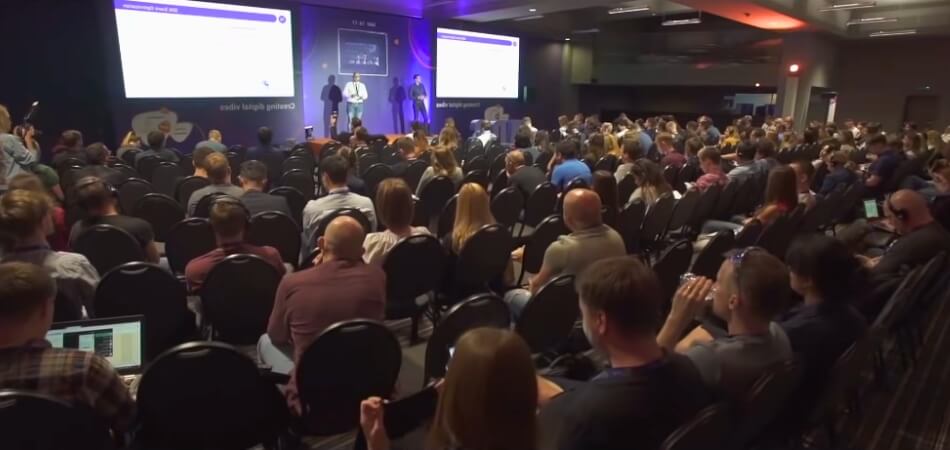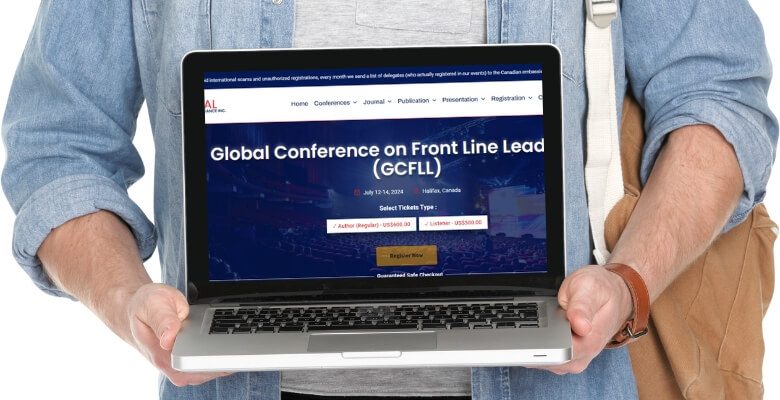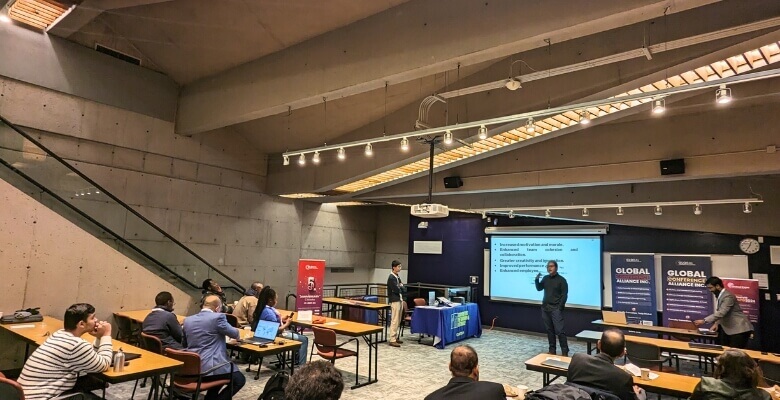As you look around, you see a sea of professionals each with their tales, expertise, and aspirations. Welcome to the Frontline Conference, where innovation and ambition are in the air. During workshops, keynote speeches, and networking sessions, the question arises: Should I go to a Leadership Conference?
Yes, attending a leadership conference can be highly beneficial. It offers opportunities to learn new skills, network with professionals, gain insights from industry leaders, and broaden your perspective. If you’re seeking personal and professional growth.
To make the most of your leadership conference experience, we’ll explore the benefits, considerations, and tips. Let’s take this journey together. Grab a cup of coffee, settle in, and let’s get started.
What is the Leadership Conference?
A leadership conference is a gathering where professionals explore strategies to become better leaders and inspire others. It provides practical tools to improve decision-making, communication, and team management skills.
Participants engage in workshops, discussions, and networking activities to share experiences and learn new techniques. These events create an environment for personal growth and professional development. The leadership conference in Canada 2024 focuses on current trends, challenges, and solutions relevant to modern leadership.
Attendees connect with experts, peers, and industry leaders from diverse backgrounds. This conference offers insights into motivating teams, building resilience, and driving innovation. Participants leave with actionable strategies to enhance leadership and achieve long-term goals.
Should I Go to a Leadership Conference?
Yes, you should attend a leadership conference can be a fantastic opportunity for personal and professional growth. These events offer a unique platform to learn from seasoned leaders, network with peers, and gain valuable insights into effective leadership practices.
Networking Opportunities
Conferences provide a conducive environment for networking, allowing you to connect with like-minded individuals, industry experts, and potential mentors. These connections can open doors to new opportunities, collaborations, and invaluable advice that can propel your career forward.
Skill Enhancement
Many leadership conferences offer workshops and breakout sessions focused on honing specific skills such as communication, decision-making, and team management. Participating in these sessions can equip you with practical tools and strategies to become a more effective leader in your organization.
Knowledge Acquisition
One of the primary benefits of attending a leadership conference is the opportunity to gain new knowledge and insights. From emerging trends in leadership to best practices in organizational management, conferences provide a wealth of information that you can apply directly to your professional endeavors.
Inspiration and Motivation

Personal Growth
Beyond professional development, leadership conferences offer a platform for personal growth and self-reflection. Engaging in discussions, sharing experiences, and seeking feedback can help you identify areas for improvement and develop a deeper understanding of your strengths and weaknesses as a leader.
Cost and Time Commitment
Before deciding to attend a leadership conference, it’s essential to consider factors such as registration fees, travel expenses, and time away from work. Evaluate whether the potential benefits of the conference outweigh the costs and if it aligns with your professional goals and priorities.
Relevance and Content
Research the agenda and topics covered at the conference to ensure that they are relevant to your interests and career aspirations. Look for sessions that address current challenges in your industry or provide insights into areas where you want to grow as a leader.
Networking Strategy
Approach the conference with a clear networking strategy, identifying key individuals you want to connect with and topics you want to discuss. Be proactive in initiating conversations, exchanging contact information, and following up with new connections after the event.
Preparation and Engagement
Maximize your conference experience by preparing in advance and actively engaging in sessions, discussions, and networking opportunities. Take notes, ask questions, and participate in group activities to fully immerse yourself in the learning experience and make the most of your time at the event.
Evaluation and Follow-Up
After the conference, take time to reflect on what you’ve learned and how you can apply it to your leadership practice. Follow up with new contacts, review your notes, and set actionable goals to integrate the insights and strategies gained from the conference into your professional development plan.
How to Choose the Right Leadership Conference for You?
Your professional development journey can be significantly impacted by the right leadership conference. You can find upcoming front line leadership conference that are filled with knowledge and networking opportunities at Global Conference. Here’s a step-by-step guide to help you pick the right candidate.
Step 1: Identify Your Goals and Objectives
Clarify what you hope to accomplish at a leadership conference. Are you looking to improve your skills, expand your network, or get inspired? Your conference selection process will be guided by your objectives.
Step 2: Research Conference Options
Find a leadership conference that suits your goals and interests next. Take into account the conference theme, agenda, speakers, and past attendees’ reviews. Look for events with relevant content and networking opportunities.
Step 3: Assess the Reputation and Credibility
Evaluate the reputation and credibility of each conference organizer. Choose events hosted by reputable organizations or industry leaders known for delivering high-quality content and meaningful experiences. Check for testimonials, endorsements, or recognition within your professional network.
Step 4: Consider Logistics and Accessibility
Take logistics and accessibility into account when selecting a leadership conference. Consider factors such as location, travel expenses, accommodation options, and dates. Choose a conference that is convenient and feasible for you to attend without undue stress or financial burden.
Step 5: Review Costs and Value Proposition
Evaluate the cost of attending each conference relative to the value it offers. Consider registration fees, travel expenses, and any additional costs associated with participation. Compare the benefits and offerings of each event to determine the overall value proposition.
Step 6: Check the Speaker Lineup and Agenda
Review the speaker lineup and agenda of each conference to ensure they align with your interests and learning objectives. Look for renowned experts, thought leaders, and practitioners who can provide valuable insights and perspectives on leadership.
Step 7: Seek Recommendations and Referrals
Reach out to colleagues, mentors, or industry peers for recommendations on leadership conferences they have attended or heard positive feedback about. Personal referrals can help you discover hidden gems and make informed decisions based on trusted opinions.
Step 8: Consider Diversity and Inclusion
Evaluate the diversity and inclusion practices of each conference organizer. Look for events that prioritize diversity in speakers, attendees, and perspectives. Choose conferences that encourage an inclusive environment where all participants feel valued and respected.
Step 9: Review Past Attendee Experiences
Research the experiences of past attendees to gauge the overall satisfaction and impact of each conference. Look for testimonials, reviews, or social media posts sharing insights and reflections from previous participants. Learning from others’ experiences can inform your decision-making process.
Step 10: Align with Your Values and Culture
Finally, choose a leadership conference that aligns with your values, principles, and organizational culture. Consider the ethos and mission of the conference organizer, as well as the topics and themes emphasized throughout the event. Selecting a conference that resonates with your beliefs can enhance the relevance and meaningfulness of your experience.
Pros and Cons of Leadership Conferences
Leadership conferences offer networking and growth opportunities. They also have their advantages and disadvantages.
Pros
- Connect with industry leaders, potential mentors, and like-minded professionals, raising valuable relationships.
- Gain insights from keynote speakers, workshops, and panel discussions, enhancing leadership skills and knowledge.
- Exposure to diverse perspectives and success stories can motivate and inspire attendees to strive for excellence.
- Participate in hands-on activities and simulations designed to improve specific leadership competencies.
- Presenting or participating in discussions can increase visibility and credibility within the industry or organization.
- Opportunities for collaboration and idea exchange with peers, leading to innovative solutions and approaches.
- Attendance at prestigious conferences can enhance professional reputation and open doors to new opportunities.
Cons
- Expenses for registration, travel, accommodation, and other associated costs can be prohibitive for some individuals or organizations.
- Conferences often require taking time away from regular work responsibilities, potentially impacting productivity.
- The abundance of sessions and information can be overwhelming, making it challenging to prioritize key takeaways.
- Content may not always align with attendees’ specific needs or interests, leading to limited value for some participants.
- Opportunities for continued learning and implementation support after the conference may be lacking.
How to Make the Most out of a Leadership Conference?
Attending a leadership conference can be a transformative experience if approached with the right mindset. To gain the most value, preparation, engagement, and follow-up are crucial. These events offer insights, connections, and actionable strategies, but it’s essential to participate thoughtfully. Below are practical tips to help you make the most of your experience.
Set Clear and Achievable Goals
Identify what you want to learn or who you aim to meet during the conference. Clear goals help you stay focused throughout the event. Understanding specific reasons to attend front line leadership conferences can also shape your objectives. Align your goals with sessions that match your professional growth needs.
Engage Actively in Sessions and Discussions
Participate by asking thoughtful questions and sharing your experiences during panels or workshops. Engaging actively helps you absorb ideas more effectively. Meaningful involvement leaves a positive impression on both speakers and attendees. Each interaction becomes a chance to exchange ideas and gain insights.
Use Networking Opportunities Wisely
Approach networking with an open mind and focus on building meaningful relationships. Engage in genuine conversations rather than collecting business cards. Use breaks and social events to connect with people from diverse industries. Networking effectively extends the value of the conference beyond its sessions.
Reflect and Create an Action Plan
Review your notes and identify key takeaways that align with your current challenges. Prioritize which strategies to implement first for better results. Create an action plan to ensure you apply what you’ve learned. Reflection ensures long-term growth and meaningful progress from your experience.
FAQS for Should I Go to a Leadership Conference?
Are you considering attending a leadership conference but feeling uncertain about whether it’s the right fit for you? Leadership conferences can be rewarding experiences that offer invaluable insights, networking opportunities, and personal growth. To help you make an informed decision, we’ve compiled a list of frequently asked questions that address common concerns and outline the potential benefits of attending.
How Can Attending a Leadership Conference Help Me Professionally?
By connecting with peers and mentors, you can expand your professional network, stay updated on industry trends, and acquire new knowledge and skills to excel in your leadership role.
Will Attend a Leadership Conference Be Worth the Investment?
While there are costs associated with registration and travel, the potential benefits in terms of personal and professional development, networking opportunities, and career advancement often outweigh the expenses.
How Can I Make the Most of My Time at A Leadership Conference?
Plan your schedule, prioritize sessions that align with your goals, actively participate in discussions and networking opportunities, and be open to learning from others’ experiences.
Are Leadership Conferences Suitable for Individuals at All Career Stages?
Yes, leadership conferences serve professionals at various stages of their careers, offering tailored sessions and opportunities for both emerging leaders and seasoned executives to learn and grow.
What Types of Topics Are Typically Covered at Leadership Conferences?
Leadership conferences cover a wide range of topics, including leadership strategies, communication skills, team building, diversity and inclusion, organizational culture, and emerging trends in various industries.
Final Thought
Attending a leadership conference can be a rewarding experience for both personal and professional growth. There’s a lot to learn and network at these events. The cost, the content, and alignment with your goals should all be taken into account. If you pick the right conference, you’ll benefit.
Should I Go to a Leadership Conference? Definitely, if you’re looking to expand your network, improve your skills, and gain inspiration from other leaders. These conferences are hubs of innovation and collaboration, where diverse perspectives come together to drive positive change.
The potential benefits for those committed to continuous learning and development far outweigh the drawbacks. Take the leap, explore new horizons, and start on your leadership journey with confidence.







